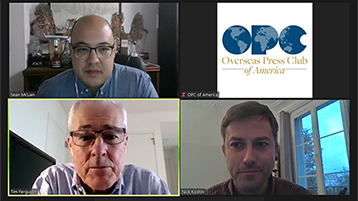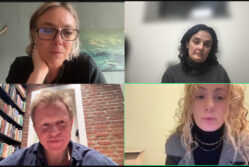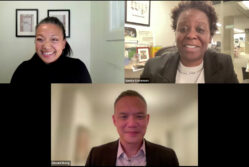Event Coverage Highlight

Malcolm Forbes Award Winners Retrace Sleuthing on the Mystery of Carlos Ghosn
by Chad Bouchard
In November 2018, the sudden arrest of Brazilian-born business executive Carlos Ghosn rocked the international business community and left journalists scratching their heads. Ghosn had been serving as chairman and CEO of an alliance he forged among automakers Renault, Nissan and Mitsubishi when Japanese prosecutors arrested him on unknown charges, and Nissan soon deposed him as chairman. He spent the next 13 months in jail and house arrest. Then in December 2019, he escaped Japan, was smuggled out of the country in a box, fled via a Turkish airliner, and ultimately turned up in Lebanon.
Nick Kostov and Sean McLain of The Wall Street Journal spent months chasing the story and unraveling events leading to his arrest. Their series of articles following the Ghosn saga won this year’s Malcolm Forbes Award for best international business news reporting in newspapers, news services, magazines or digital.
On Oct. 28, the duo retraced their reporting for an OPC program in honor of the award. The session was moderated by Tim Ferguson, business journalist and former editor of Forbes Asia, who served as head judge for the Malcolm Forbes Award jury.
McLain, who is based in Japan, recalled first hearing the news about Ghosn’s arrest while on his way home to cook an anniversary dinner for his wife. “I think my most coherent response was ‘what?’” he said.
“And I went home at 3:30 in the morning that night, and then for two straight weeks stayed up until three in the morning in the office trying to figure out what the heck had happened. “
Kostov, speaking from his base of operations in Paris, recalled challenges of reporting the story in the early stages, with little access to key information.
“Obviously we had one side of the story. Nissan CEO [Hiroto] Saikawa gave a press conference and we could hear the Japanese [government] side, but on the Ghosn side, it was impossible to get any information about what he thought about the allegations, about whether he was saying he was innocent, whether he was admitting to what they said he did. It was, in the early days, a very much one-sided story.”
By the mid-1990s, Ghosn was considered a rising star in French firms, with many years under his belt in leadership positions at Michelin and Renault. He was known as “Le Cost Killer” for closing factories and laying off employees. He spearheaded an alliance between Renault and Nissan in Japan at the turn of the century, adding Mitsubishi in an acquisition in 2016, and was lauded for his leadership at the helm of an automotive empire.
It would be weeks before Ghosn spoke up and rejected charges against him. McLain said at first, their investigation relied heavily on “shoe leather,” as he burned through his Rolodex and Nissan’s company directory to find sources with any insight about what had happened. He eventually found a handful of people within the company with useful information, by “finding addresses, and then going to their houses late at night until they came home, and asking them questions,” McLain said. “It was really just hustling. Ninety percent of reporting is just working harder than the competition, if you’re going to beat them, so it was just brute strength and stubbornness in those early days to get anything.”
By March 2019, McLain and Kostov were piecing together details from sources and interrogating some prevailing assumptions, such as the reason for the specific timing of the arrest, which people at Nissan had been chalking up to disclosures of a possible unknown whistleblower.
“It was too simple,” McLain said.
Kostov said they began to tease out two competing narratives, with one side speculating that Ghosn was responsible for his own undoing through inappropriate actions, and on the other side that it had been a plot by forces within the company to oust him ahead of a planned merger.
“The two narratives are not necessarily mutually exclusive. So it’s just trying to find as many documents as you can to see which one of these things is true,” he said. “By the time we get to March, we did start to have a lot of emails, bank transfers, various other documents which helped to stand up one or the other.”
“So Nick [Kostov] did a lot of yeoman’s work trying to nail this down,” McLain added. “The group of four prosecutors who ultimately provided the evidence necessary to arrest him were spurred on by a notion that Carlos Ghosn was planning a merger between Renault and Nissan,” he said. “We were able to show that there was a corporate intrigue angle to this story.”
McLain said when people within a company in the U.S. find out that leaders are doing something inappropriate, usually those incidents are handled quietly within the board to protect the company.
“In this case what made it so unusual is that a group of executives within Nissan found something that they thought was inappropriate but didn’t tell the board, and didn’t tell the CEO for months, and instead worked with prosecutors secretly.”
The two also discussed some of the quirks of the Japanese legal system, which relies heavily on direct interrogation in jail and oral testimony rather than external sources such as wiretapping or digital evidence gathering.
Ghosn was arrested and interrogated by the prosecutor’s office rather than police, which meant according to Japanese law no defense attorney could be present. He was grilled for seven days a week, for up to six hours at a time, McLain said. This approach, dubbed the “hostage justice system,” has come under fire from critics.
Other defendants, such as Greg Kelly, who was Ghosn’s top aide and a Nissan director, were also interrogated while in jail. McLain said prosecutors in cases like this often to try to flip a defendant who is subordinate to a top executive to build a case against them.
McLain and Kostov were able to exploit a contentious dynamic between Renault and Nissan in which the two sides avoided sharing information or talking directly with each other, making them “like a child in the middle of a messy divorce.”
“The fact that we knew more and were deeper inside the respective companies was kind of the key,” McLain said. “Not only did they fear what we knew, but they also knew that because we knew so much, we would treat the story with the appropriate amount of nuance.”
Ghosn was last known to be still living in Lebanon.
“I guess he’s living as a free man,” Kostov said. “The issue for him is that there’s an INTERPOL Notice so he can’t travel internationally, and that’s something we expect at some point he’ll try to lift.”
Asked to encapsulate the legacy of the Ghosn case, McLain said his arrest highlighted “the resistance and the inertia surrounding what he wanted to do with these companies.” Ghosn envisioned a multinational corporation that adds value by preserving cultural differences rather than subsuming them, he said. “And the resistance to that idea that persisted over 20 years was the impetus of his downfall.”
Click the window below to see a playlist of video clips from the program.




